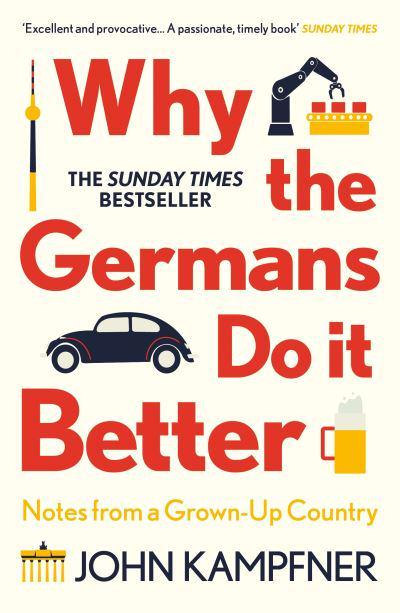Book Review – September 2021
In 1994, when Angela Merkel was Germany’s environment minister, her British opposite number, John Gummer, invited her to stay with him and his family in his Suffolk constituency. They spent each evening in his sitting room talking about politics. Before she left he took her for a drink at his local Conservative association club. According to John Kampfner’s account, she chatted to a number of local Tories and was ‘taken aback by the anti-European sentiments, the incessant invocation of the war’. For Merkel it was a lesson about a particular strand of English opinion; an insight she never forgot and one which came to a head with the Brexit vote of 2016.
Why the Germans Do it Better is a work of meticulous research and sober analysis; a well-written overview of post-war German history. The only thing that spoils it is the click-bait style title. But, perhaps, that is the point: this book is as much a book about Britain as it is about Germany. Kampfner does not lecture his readers: we are left to draw our own conclusions. But present-day Britain does not compare well with our neighbours from across the North Sea. Germany is indeed a grown-up country, one that has come to be at peace with its past and comfortable with its role in Europe. Whereas Britain, he suggests, is trapped in the past and swayed by a fantasy world of imperial power.
Germany is a strong liberal democracy at the heart of Europe; a country of serious-minded politicians. Angela Merkel and the UK’s Boris Johnson are both conservatives, but they are cut from an entirely different cloth. At the height of the Syrian crisis Merkel welcomed a million refugees to Germany. Johnson, like his predecessor, continues to play to the jingoist gallery and now threatens to ‘turn back’ refugee boats.
Kampfner divides his book thematically rather than chronologically. He examines history, society, politics and the economy through the key themes of post-war reconstruction, reunification, multi-culturalism, the green movement and the Merkel era. Although Germany’s economic achievements are immense, particularly in reinvigorating the economy of the East after reunification, it is Germany’s social structure that Kampfner highlights.
Germans in large numbers are involved in clubs, societies and voluntary associations. Culture and the arts are highly regarded and subsidies to artists are generous. It is a country that emphasises the community rather than the individual. Germany’s cities are vibrant regional centres and the country as a whole is not dominated by the capital, as is the case in France and the UK. Indeed, without Berlin Germany’s GDP would actually be 0.2% greater.

Das Deutsches Eck, Koblenz. Confluence of the Mosel and Rhine and symbolic birthplace of modern Germany. ©Bobby Seal
But, as a long-time resident of Germany, Kampfner accepts that German society is far from perfect. It lags behind other nations in the adoption of digital technology and its infrastructure is beginning to creak. In politics Merkel’s open-door approach to refugees has provoked a negative response from some and the far-right AfD is gaining ground.
But Kampfner sees much to be optimistic about for the future. Merkel’s government is widely acknowledged as having managed the COVID-19 crisis extremely well with far fewer deaths per 100k of population than the UK and USA. Mutti, as she is known, will soon gone, but even without her, Kampfner asserts:
Germany is Europe’s best hope in this era of nationalism, anti-enlightenment and fear. Britain was always seen as a beacon, America too, but both countries have abrogated much of their responsibility to the wider world. Who will represent European values in a fast changing world? Who will stand up to authoritarian regimes? Who will make the case for liberal democracy? Germany can, because it knows what happens when countries fail to learn the lessons of history.


This does sound like an interesting read, thank you for sharing!
Thanks Liz, that’s very kind. On a morning when we seem to be contemplating sending gunboats to the South China Sea and Johnson is threatening to bring back pounds and ounces, it really does seem like Britain is living in a ‘fantasy world of imperial power’!
You forgot the PAST TENSE OF GERMANY.
THEY WERE /ARE A MIXTURE OF PEOPLE, EXACTELY LIKE THE UNITED STATES
THEY CALL THEMSELVES A SO _CALLED FEDERATION.
THE IDEA IS THAT THAT FEDERATION OF GERMANY IS NOT GERMANS.
MANY PEOPLE WERE GERMANIZED (AS IN THE UNITED STATES?= ENGLIZIZED)
THE PRUSSIANS WERE SOME OF THE GERMANY’S KINGS,THEY WERE ALL ROMANS AND THRACIANS…NOT THE POPULAS OF GERMANY
THE SAME IS WITH ALL THE SCIATITIST OF GERMANY AND OF ALL OF EUROPE